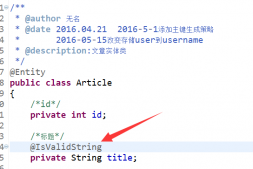一介绍:
在JavaSE1.5之前,没有泛型的情况的下,通过对类型Object的引用来实现参数的“任意化”,“任意化”带来的缺点是要做显式的强制类型转换,而这种转换是要求开发者对实际参数类型可以预知的情况下进行的。对于强制类型转换错误的情况,编译器可能不提示错误,在运行的时候才出现异常,这是一个安全隐患。
泛型的好处是在编译的时候检查类型安全,并且所有的强制转换都是自动和隐式的,提高代码的重用率。
二、泛型参数:
|
1
2
3
4
5
6
7
8
9
10
11
12
13
14
15
16
17
18
19
20
21
22
23
24
25
26
27
28
29
30
31
|
class Gen<T> { private T ob; //定义泛型成员变量 public Gen(T ob) { this.ob = ob; } public T getOb() { return ob; } public void setOb(T ob) { this.ob = ob; } public void showType() { System.out.println("T的实际类型是: " + ob.getClass().getName()); }}public class GenericParameter { public static void main(String[] args){ //定义泛型类Gen的一个Integer版本 Gen<Integer> intOb=new Gen<Integer>(100); intOb.showType(); int i= intOb.getOb(); System.out.println("value= " + i); System.out.println("----------------------------------"); //定义泛型类Gen的一个String版本 Gen<String> strOb=new Gen<String>("Hello Dylan!"); strOb.showType(); String s=strOb.getOb(); System.out.println("value= " + s); }} |
output:
T的实际类型是: java.lang.Integer
value= 100
----------------------------------
T的实际类型是: java.lang.String
value= Hello Dylan!
三、泛型类:
|
1
2
3
4
5
6
7
8
9
10
11
12
13
14
15
16
17
18
19
20
21
22
|
class GenericsFoo<T> { private T x; public GenericsFoo(T x) { this.x = x; } public T getX() { return x; } public void setX(T x) { this.x = x; }}public class GenericClass { public static void main(String args[]){ GenericsFoo<String> strFoo=new GenericsFoo<String>("Hello Generics!"); GenericsFoo<double> douFoo=new GenericsFoo<double>(new double("33")); GenericsFoo<Object> objFoo=new GenericsFoo<Object>(new Object()); System.out.println("strFoo.getX="+strFoo.getX()); System.out.println("douFoo.getX="+douFoo.getX()); System.out.println("objFoo.getX="+objFoo.getX()); }} |
output:
strFoo.getX=Hello Generics!
douFoo.getX=33.0
objFoo.getX=java.lang.Object@1d0fafc
四 限制泛型:
|
1
2
3
4
5
6
7
8
9
10
11
12
13
14
15
16
17
18
19
20
21
22
23
|
import java.util.ArrayList;import java.util.Collection;class CollectionGenFoo<T extends Collection> { private T x; public CollectionGenFoo(T x) { this.x = x; } public T getX() { return x; } public void setX(T x) { this.x = x; }}public class GenericRestrict { public static void main(String[] args) { CollectionGenFoo<ArrayList> listFoo = null; listFoo = new CollectionGenFoo<ArrayList>(new ArrayList()); CollectionGenFoo<? extends Collection> listFoo1 = null; listFoo1=new CollectionGenFoo<ArrayList>(new ArrayList()); System.out.println("实例化成功!"); }} |
output:
实例化成功!
五 泛型方法:
|
1
2
3
4
5
6
7
8
9
10
11
12
|
public class GenericFunction { public <T> void f(T x) { System.out.println(x.getClass().getName()); } public static void main(String[] args) { GenericFunction ea = new GenericFunction(); ea.f(" "); ea.f(10); ea.f('a'); ea.f(ea); }} |
output:
java.lang.String
java.lang.Integer
java.lang.Character
GenericFunction
-----------------------------
dylan presents.
总结
以上就是本文关于java中generic实例详解的全部内容,希望对大家有所帮助。如有不足之处,欢迎留言指出。感谢朋友们对本站的支持!
原文链接:http://blog.csdn.net/indexman/article/details/17485361















